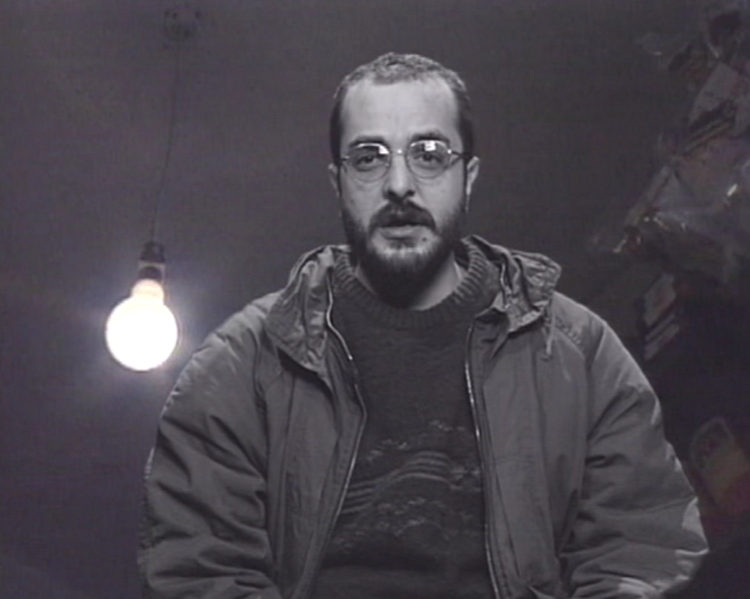A special edition of Vtape’s Curatorial Incubator
Curated by Noor Alé and Claudia Mattos
All is well on the border
Opens April 22, 2017
April 20-27, 2017
Images Festival and Vtape Co-presentation
All is well on the border presents a collection of video works that contend with life on the margins. The program takes its name from the same-titled 1997 Akram Zaatari documentary, which offers for wide viewing the testimonies of three prisoners held in detention centers during the Israeli occupation of South Lebanon. These gathered works align histories, accounts and experiences surrounding immigration, exile, statelessness, and the precarity of moving across sovereign borders, as well as the fringes of social and cultural boundaries. These liminal zones have come to increasing prominence on the backs of refugee crises stemming from Afghanistan, Somalia and Syria, and activist platforms that have granted greater visibility to those in the periphery. And as the Internet and its digital affects have staked greater claims in the lives of people, globally; and facilitated communication and the bridging of experiences beyond arbitrary boundaries; borders, too, have grown increasingly irrelevant in our highly interconnected and global communities.
In these times of heightened national security, mass globalization, civic unrest and the rise of nationalist movements throughout the West, borders are both foregrounded and swept aside; highly policed or easily crossed; and used to reinforce geopolitical agendas and causes. All is well on the border is in many ways a case study of border states across diverse cross-sections of global society, offering a nuanced picture of the myriad lines that divide our world.
=============================
The Program
Akram Zaatari, All Is Well On the Border, 1997, 43:00
A critique of the political slogans which usually dominate the image of the shrit, or the occupied frontal zone in South Lebanon.
Mieke Bal and Shahram Entekhabi, Lost In Space, 2005, 17:00
The film about homelessness and displacement tears apart the different manifestations of language.
Guillermo Gomez-Pena, Declaration of Poetic Disobedience, 2005, 15:15
“In November of 2003 I began to write this text. It was my clumsy attempt at finding a post-9/11 voice and place in another map-an imaginary one drafted by me.” (G G-P)
Mona Hatoum, Measures of Distance, 1988, 15:25
This early work is concerned with the artist’s separation from her Palestinian family and in particular, her relationship with her mother whose letters from Beirut are read aloud as the soundtrack to the tape.
Julia Meltzer and David Thorne, Not a matter of if but when…, 2007, 17:40
Developed with Rami Farah in 2005–06 in Damascus, when momentous events reverberated throughout Syria giving rise to widespread anxiety and anticipation around the potential for imminent change, regime change, internal reform, internal collapse, civil war and the increased power of fundamentalist Islam.
=============================
Curators’ Bios
Noor Alé is an Exhibitions Program Officer at the National Gallery of Canada. In her previous capacity, she served as Project Coordinator and Content Writer for the National Gallery of Canada’s Foundation, where she wrote on patronage history, major acquisitions, and upcoming exhibitions intended to showcase the philanthropic objectives realized through the Foundation. In the past, she was the Program Coordinator at Art Dubai, where she assisted with non-profit programs, among them the Global Art Form, an annual symposium under the curated theme “Download Update?” which reflected on the ways technology has reconfigured our lives. She has also contributed to curatorial research and public programming at the Solomon R. Guggenheim Museum, the Royal Ontario Museum, the Art Gallery of Ontario, the Canadian Art Foundation, among others. Noor holds a Master’s in Art History from the Courtauld Institute of Art, and a Bachelor’s in Art History from the University of Guelph.
Claudia Mattos is an independent curator and writer, and currently serves as Interim Exhibitions and Programming Director for the Miami-based experimental art space Locust Projects. Previously, she served as Curatorial Assistant and Content Editor at Performa, the New York performance art biennial. Prior to this, she worked at the Whitney Museum of American Art in the months leading to its 2015 inaugural exhibition, where she worked on research surrounding the exhibition Carmen Herrera: Lines of Sight. She has previously contributed to curatorial research and writing for the Institute of Contemporary Art, Miami, FL; Independent Curators International, New York, NY; Rubell Family Collection, Miami, FL; David Castillo Gallery, Miami Beach, FL; and the Herbert F. Johnson Museum, Ithaca, NY; among others. She earned her MA in Art History from the Courtauld Institute of Art, London, UK; and a BA in Art History and Visual Studies from Cornell University, Ithaca, NY.
Artists’ Bios
Akram Zaatari is an artist, curator and co-founder of the Arab Image Foundation through which he developed his study project on photography and his ideas on collecting as an art practice.
Mieke Bal, well-known cultural critic and theorist and video artist and curator, is based in Amsterdam. Her most recent publication, In Medias Res: Nalini Malini, was published by Hatje Cantz (2016).
Shahram Entekhabi is an Iranian-born video and installation artist. Born and raised in Mexico City, interdisciplinary artist/writer Guillermo Gómez Peña came to the U.S. in 1978. His performances and critical writings have been instrumental in the development of debates on cultural diversity, identity and U.S. Mexico relations.
Mona Hatoum is a Palestinian born in Beirut, Lebanon who has been living and working in Britain since 1975. Her poetic and political oeuvre is realised in a diverse and often unconventional range of media, including installations, sculpture, video, photography and works on paper.
Los Angeles based Julia Meltzer and David Thorne produce videos, photographs, and installations. From 1999 to 2003, their projects centered on secrecy, history, and memory. Current works focus on the ways in which visions of the future are imagined, claimed, and realized or relinquished, specifically in relation to faith and global politics.

